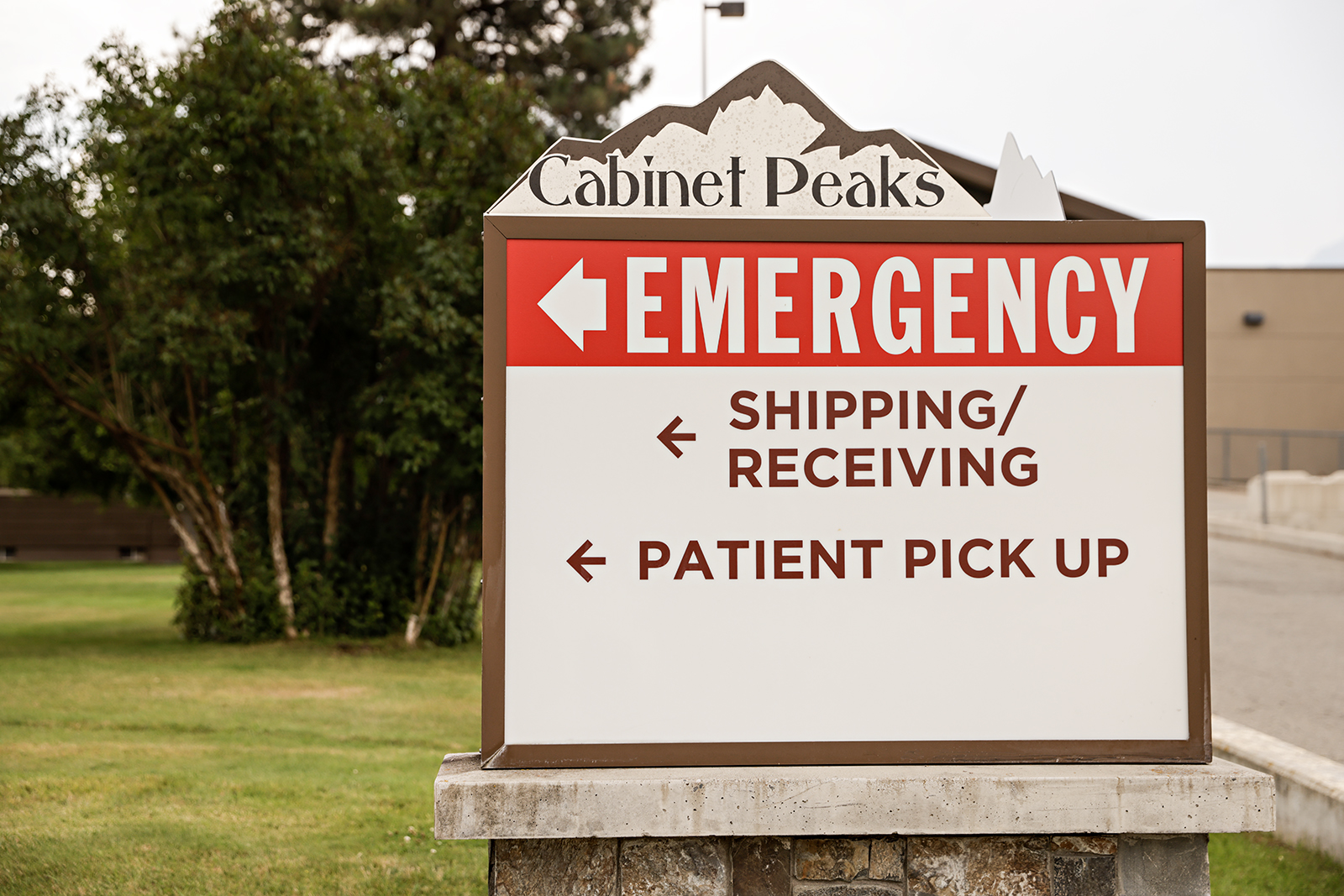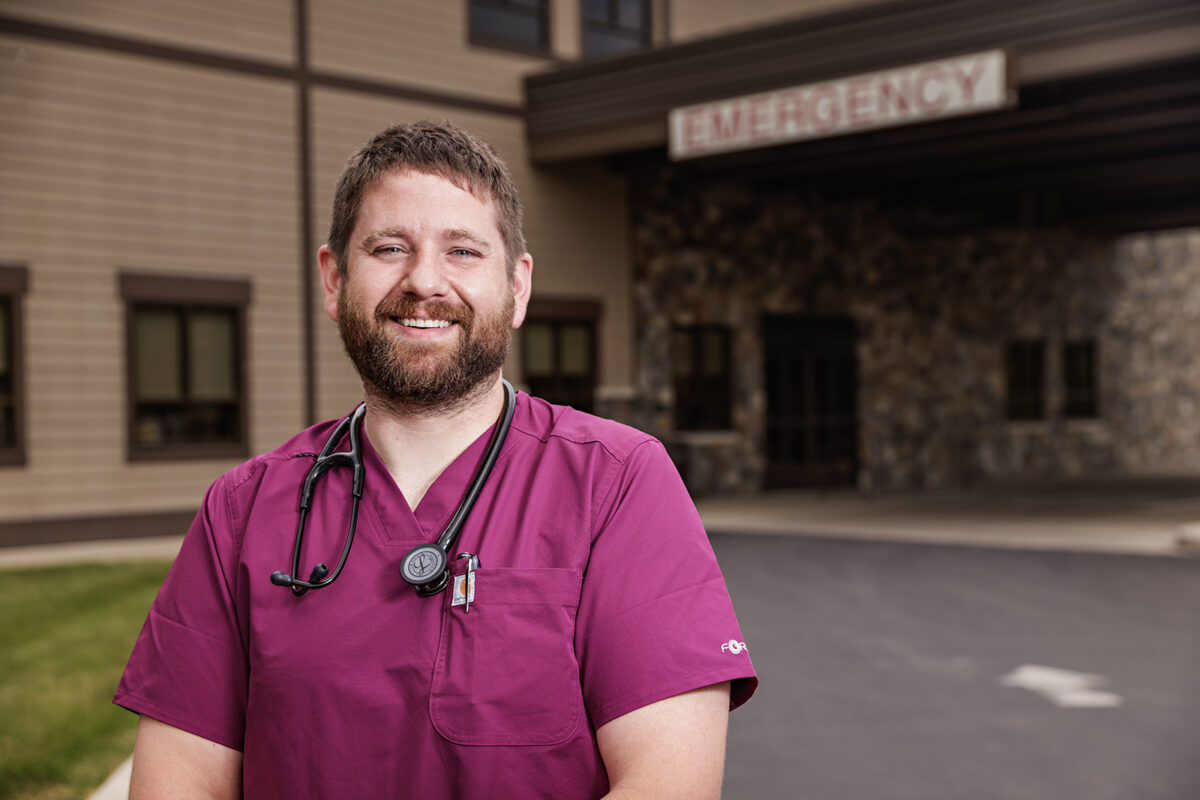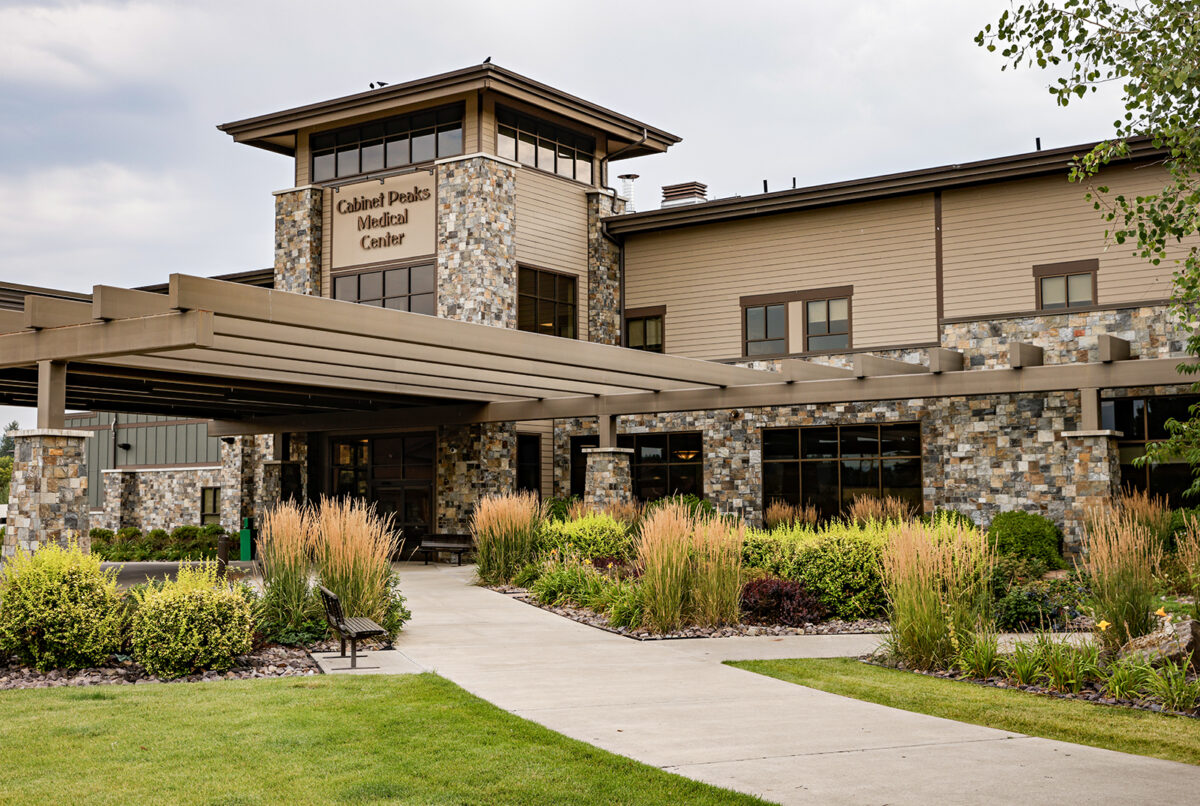Building Libby’s Nursing Workforce
Through partnerships with local hospitals and clinics, Flathead Valley Community College's Libby campus is training local healthcare workers while striving to ease a nursing shortage
By Denali Sagner
Editor’s Note: This story is part of The Rural College Project, an ongoing series about efforts to expand access to higher education for rural students in Montana. This series was produced with support from the Education Writers Association Reporting Fellowship program.
Luke Dahm didn’t think he could become a nurse.
Tall and scruffy with reddish-brown hair, Dahm is a certified local and a Libby son. At 32, he’s lived more lives than most. He dropped out of high school as a teenager, discouraged by his struggles with academics. He moved to Seattle at 18 to attend underwater welding school, later moving to Louisiana and North Dakota to work as a welder.
Dahm says welding was a “beautiful career,” but unpredictable. Jobs and money depended on the oil market and took him far from home.
When his mom became ill, he came back to Libby and worked as a ski patroller. In his Carhartts and work clothes, he felt foreign in the hospital, where he spent hours sitting by his mom’s side. A nurse herself, Dahm’s mother always encouraged her son to enter the profession.
On one visit to the hospital, Dahm met a male nurse who had left the trades to work in healthcare.
“That kind of got the gears turning. I was like, maybe this is possible,” he said.

Sitting in the student lounge at Flathead Valley Community College’s (FVCC) Lincoln County Campus (LCC), Dahm is a success story. Last spring, he was one of 12 graduates of FVCC’s nursing program, a competitive degree track that trains registered nurses in the Flathead and Tobacco valleys. Since graduation, he’s worked at Cabinet Peaks Medical Center, a 25-bed critical access hospital in Libby.
“Thank goodness that they were here for someone like me to actually attend this program, to now be a part of the community,” Dahm said of LCC’s educators. “There’s not a lot of people who grow up in this area who have those opportunities.”
The goals of FVCC’s Libby-based nursing program are twofold — offer a highly-skilled degree program to Libby students, and help to fill the rural area’s hospitals and clinics with qualified nurses.
“My students are not only going to get well-rounded experience and education,” FVCC Libby Nursing Coordinator Katie Johnson said, adding that they receive “intimate help from the nurses” in northwest Montana who offer hands-on training during clinical rotations.
Born and raised in Libby, Johnson relocated to earn her nursing degree, before there was a dedicated program in Libby.
Now, four students per year can earn their nursing degree in Libby through a combination of in-person and virtual classes and clinical rotations. LCC’s nursing students work in close collaboration with FVCC’s main campus in Kalispell, where they can take courses in the classroom or through interactive, video teleconferencing equipment. Students do their clinicals at Cabinet Peaks, Logan Health, family practice centers and the Center for Asbestos Related Disease (CARD) Clinic.
FVCC’s nursing program holds accreditation from the National League for Nursing Commission for Nursing Education Accreditation. The program’s students since 2019 have passed the NCLEX nursing licensure exam at a 93.8% rate.
“Our team’s view of having this relationship with the college and the students is that we’re investing in the next generation. We’re investing in the future,” Kimberlee Rebo, director of acute care services at Cabinet Peaks, said.
Hiring qualified professionals has long been a challenge for rural hospitals — one that was only exacerbated by the stresses of the pandemic.
In a 2021 survey of 130 rural hospital leaders by healthcare advisory firm the Chartis Group, nearly all respondents reported having trouble filling nursing positions. A KFF/Washington Post survey conducted that same year found that three in 10 healthcare workers had considered leaving the profession and six in 10 said the stress of the pandemic had harmed their mental health.
Nursing shortages have been attributed to a number of factors. Retention in the profession is low, with more than 50% of nurses leaving their job within the first two years. Nurses have expressed feeling undervalued and undercompensated. Though thousands are turned away from degree programs each year, there aren’t enough instructors to train the needed number of new professionals. Around one million nurses in the U.S. are 50 years of age or older, and retirement is on the horizon.

Hospitals often fill gaps with travel nurses. While helpful in a pinch, travel nurses are temporary and can be pricey for rural clinics, many of which are already struggling under budget pressures.
As Lincoln County’s population grows, so too will demand for healthcare services. Libby’s population is aging faster than the rest of the state, and its baby boomer residents will soon need increased medical care. According to Rebo, Cabinet Peaks is seeing more patients from across Lincoln County, Sanders County and northern Idaho.
A city of less than 3,000 residents, Libby is a close-knit community, and one whose story is grounded in a public health disaster.
For decades, workers at Libby’s W.R. Grace vermiculite mine were unknowingly exposed to deadly asbestos fibers, and trains carrying asbestos products blew toxic dust across town. Nearly 700 Libby residents had died of asbestos-related diseases as of 2021. The CARD Clinic since 2003 has operated as an independent medical center, treating Libby residents suffering from asbestos-related conditions.
It’s a story that Dahm and other Libby locals know well. In working with patients, Dahm said his local roots help connect him to patients as he builds trust and provides care.
“These are my people. This is my community,” Dahm said. “You know their uncle, or you went to school with their brother.”
According to FVCC President Jane Karas, 95% to 100% of the college’s nursing graduates stay in the area.
Johnson and Rebo hope to expand the nursing program in the coming years. Right now, spots for nursing students are limited by the number of local healthcare workers who can train them during clinical rotations. Though fulfilling, Rebo said, teaching adds another responsibility for nurses who are already handling heavy caseloads.
“We want to be mindful of our nurses to make sure that we’re not burning them out,” she said. “We have had to limit our student numbers based on what is appropriate without putting too much onto the team.”
In an email, Rebo added that “taking care of our current nurses helps us to be able to continue this strong relationship.”
There’s growth on the horizon for Cabinet Peaks, though. Hopefully, program administrators said, the ability to train more nurses will come with it.
Dahm said he encourages everyone he knows in Libby to apply for the nursing program — young, old, male, female, early- and mid-career. The program changed his life. He hopes it can change others’ lives, too.
“It’s truly one of the best things that I’ve done in my life. I’m so happy to go to work now. It’s so much fun. My team in the ER, you couldn’t ask for better providers, nurses. Everybody’s so supportive. I love it. I truly love it,” he said. “That light at the end of the tunnel is so blindly bright. It is so worth all the heartache. Nothing in life worth having came easy, so the grind truly pays off.”